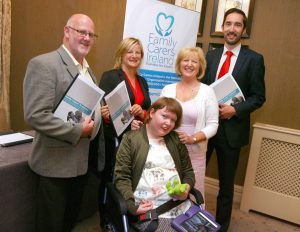Family Carers Ireland Launches ‘Scorecard’ On Progress Of National Carers’ Strategy
National Carers Strategy monitoring group launched its ‘Family Carers’ Scorecard’, assessing what the National Carers’ Strategy has achieved for family carers since its launch in July 2012.
This is the third year-on-year scorecard published, and is based on an assessment of Government’s Third Progress Report on the Strategy from September 2014 – September 2015.
Of the 42 objectives outlined in the National Carers’ Strategy, Family Carers have found:
• 1 objective achieved thus far
• 14 good progress made
• 7 initial progress made
• 17 with no progress
• 3 having regressed
“While we find just one objective fully achieved, we have seen some good progress on the National Carers’ Strategy over the past three years, particularly given its cost-neutral limitations” said Catherine Cox, Head of Communications, Family Carers Ireland.
“Good engagement with Government departments has brought meaningful progress. However, critical areas such as respite provision and discharge from hospital to home remain significantly under-resourced, resulting in negative impacts on family carers’ lives, and correspondingly regressive scores. With the upturn in our economy, we are now asking Government to adequately resource and fund the next phase of the Strategy in order to make a real impact on the lives of family carers.”
Some areas where good progress has been achieved in the National Carers Strategy include:
- The continued convening of an annual Carers’ Forum to provide carers with a voice at policy level.
- Improvements have been made to transitioning arrangements for carers at the end of their caring role.
- Raising awareness, particularly among education providers, of the signs that children and young people have caring responsibilities and the impact of caring on them.
The three National Carers’ Strategy objectives identified as having regressed are:
- Identify carers and their involvement in discharge planning
- Promote a range of person-centred and flexible respite options
- Identify gaps in existing services and establish performance indicators for the provision of respite services.
The average family carer in receipt of Carer’s Allowance contributes €67,000 in unpaid work each year in return for a maximum Carer’s Allowance payment of €10,600. Overall, Family carers contribute 6.2 million hours of unpaid care each week, saving the State €4 billion each year. Investing in family carers will only save the state financially and ease pressure on health services.
